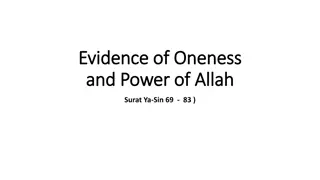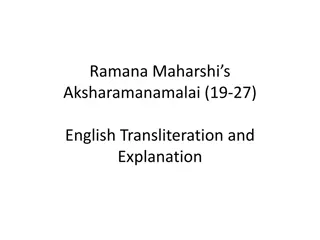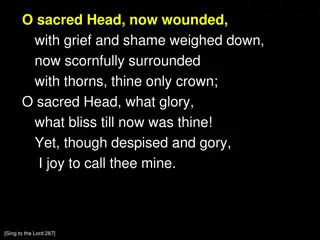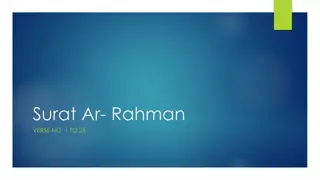Reflections on Surat Al-Muzzammil: Lessons from Verses 13-16
Explore the deep insights and lessons derived from the tafsir of verses 13 to 16 of Surat Al-Muzzammil. Delve into the themes of punishment, the Day of Judgment, the roles of the messengers of Allah, and the consequences of disbelief. Reflect on the vivid descriptions and warnings found in these verses, drawing parallels to historical events and the significance of faith in guiding humanity.
Download Presentation

Please find below an Image/Link to download the presentation.
The content on the website is provided AS IS for your information and personal use only. It may not be sold, licensed, or shared on other websites without obtaining consent from the author.If you encounter any issues during the download, it is possible that the publisher has removed the file from their server.
You are allowed to download the files provided on this website for personal or commercial use, subject to the condition that they are used lawfully. All files are the property of their respective owners.
The content on the website is provided AS IS for your information and personal use only. It may not be sold, licensed, or shared on other websites without obtaining consent from the author.
E N D
Presentation Transcript
Surat al Muzzammil Lesson Six
Lesson Plan Objectives Tafsir of Verses 13,14,15 and 16 Relevant verses and ahadith Important lessons Activity
Objectives To reflect on 1.Why is the punishment of hell created? 2. Is this world going to last forever? Yes or No? What are the signs for it? 3. What are the aims of the messengers of Allah (swt)?
Verse 13 This verse talks about the painful punishment on the day of judgement for the disbelievers. The verse describes the food which will choke them and a painful punishment that is prepared for them. These disbelievers had food that was pleasant to taste in this world and they indulged in the pleasure of flesh. In the day of judgement they will have food that will choke and painful torments will be in store for them in the day of Judgement.
Verse 14 This verse talks about the day of judgement that would cause a violent commotion that it would change the appearance of the physical world and it would violently affect the laws of nature. The word represents Dune and sand hill . The word implies pouring something soft like sand and flour on something else. The verse reflects that the mountains shall disintegrate on the Day of Resurrection.
Verse 15 Verse 15 talks about the Holy Prophet Muhammad (pbuh) that he witnesses the deeds in this world and will bear witness to the same on the Day of Resurrection. The verse compares the Holy Prophet Muhammad (pbuh)to Prophet Musa (as). Fulfilment of Prophet Muhammad (pbuh) call requires supervision Our Holy Prophet (pbuh) supervises all the deeds of his community.
Verse 16 This verse mentions that Pharaoh rose against the Messenger of Allah (as) and Allah (swt) inflicted severe torments on him. History shows us that nothing could obstruct the Divine torments; in fact they were all drowned in the raging waves of the Nile in which they took pride. The word represents heavy shower but it connotes any heavy and severe thing particularly torments. In this verse it implies that severity of the torment that it showers upon the sinners like heavy downpour of rain and disobedience to the commands of Allah (swt) Messenger entails torments and entanglements.
Relevant Verses This verse talks about the food the disbelievers will have will be of no help to them. Surat al Ghashiyah Verse 6 7 . This verse instructs mankind to have faith in Allah and His Apostle (Prophet Muhammad (pbuh)) so that we are guided. Surat al A raf Verse 158
Relevant ahadith The Holy Prophet Muhammad (pbuh) said, Indeed the example of my household among you is like that of Noah s ark; whosoever embarked it was saved and whosoever chose to remain behind it was drowned The Holy Prophet Muhammad (pbuh) said, Increase the remembrance of the demolisher of desires. He was asked, O Messenger of Allah, what is the demolisher of desires? He said, Death, for the most sagacious believers are those who remember death the most and are the most prepared for it .
Important lessons Punishments are reminders Think of the temporary nature of this world Prophet Muhammad (pbuh) came to guide mankind
Activity Take an A4/A3 sheet of paper Draw Noah s ark and draw 14 flags on the ark. These 14 flags represent our 14 ma soomeen (as). What lessons can you take from each ma soom (as) and implement in your lives? Write them down on each flag.























